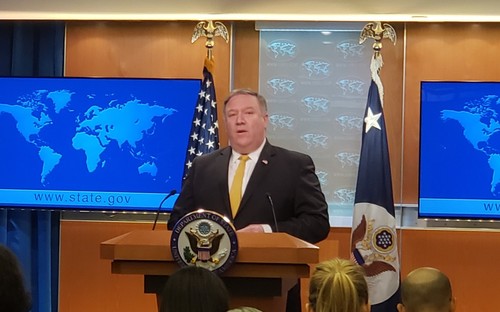 |
|
US Secretary of State Mike Pompeo
|
N. Korea unable to move forward or backward in current deadlock
As the deadlock in the negotiations between North Korea and the US drags on, the two sides appear to be digging in for the long haul. Since US Secretary of State Mike Pompeo made his fourth visit to North Korea in October, the US has insisted that it’s not “in a hurry” as it cranks up pressure and sanctions against the North without managing to reach a compromise. Meanwhile, the North is explicitly demanding that it be compensated for denuclearization, an indication that it’s unwilling to make any more concessions. On Dec. 16, North Korea’s state-run Korean Central News Agency (KCNA) published a statement attributed to the chief of policy research at the Institute for American Studies, under the North Korean Ministry of Foreign Affairs, which reiterated the North’s basic stance that sanctions and pressure without confidence building will never force it to give up its nuclear program. “This could have consequences that no one wants, such as the permanent blockage of the road to the denuclearization of the Korean Peninsula,” the statement warned. That wasn’t the only striking passage in the statement – it also called out US Secretary of State Mike Pompeo for getting in the way of US President Donald Trump. “President Trump has taken every opportunity to express his commitment to improving relations with North Korea. Far from the statements of the president, the State Department is instead bent on bringing the DPRK-US relations back to the status of last year which was marked by exchanges of fire. I cannot help but throw doubt on the ulterior motive of the State Department,” the statement read. Far from the statements of the president, the State Department is instead bent on bringing the DPRK-US relations back to the status of last year which was marked by exchanges of fire. I cannot help but throw doubt on the ulterior motive of the State Department,” it continued. North Korea’s overt expression of its dissatisfaction with Pompeo is likely the result of the US’ inflexible position since Pompeo’s fourth visit to the North in October. At the time, North Korean leader Kim Jong-un personally met Pompeo for five and a half hours, sending a pointed message that he is making every effort to improve ties with the US, but since then the US has only tightened the screws of pressure and sanctions. Considering that North Korea has continued to ignore subsequent US requests to hold high-level and working-level talks, some foreign affairs analysts have inferred that the North wants to skip the working-level talks and go straight to a summit. Koo Kab-woo, a professor at the University of North Korean Studies, said that the content of this statement “supports the interpretation that North Korea is counting on striking a deal [with President Trump] during the summit.” While the US asserts that there are no prerequisites for holding a second summit, it has reportedly been unwilling to bend on its stance that the summit must be preceded by high-level and working-level talks. After Trump repeatedly stated on Dec. 14 that he’s “in no hurry” regarding negotiations with North Korea, foreign policy experts have concluded that the US is currently focused on maintaining the status quo. Pompeo recently used the word “patience” in regard to negotiations with North Korea, suggesting that the US may be content with the status quo because it has concluded that the immediate threat to the US mainland is being managed by North Korea’s suspension of nuclear weapons and missile tests. “North Korea probably won’t backtrack on the denuclearization issue. At the moment, it’s unable to move either forward or backward,” said Cho Sung-ryul, senior research fellow for the Institute for National Security Strategy. “Both sides are waiting [for the negotiations], and there aren’t any indications that they’re trying to upset the applecart. But whereas the needle was pointing toward momentum [for dialogue] a couple weeks ago, the signals we’re seeing now are a little worrisome,” said a diplomatic source who’s familiar with North Korea-US relations. On the surface, both sides are holding out as if time is on their side, but there are also some who think that the impasse won’t become prolonged. Because of the domestic political dynamics in South Korea, North Korea and the US, if the three countries aren’t able to get “results” by the middle of 2019, it will become basically impossible to resolve the North Korean nuclear issue. Sources also say that White House officials remain in discussions with North Korea about the timing and location of the second North Korea-US summit. By Kim Ji-eun, staff reporter Please direct comments or questions to [english@hani.co.kr]






